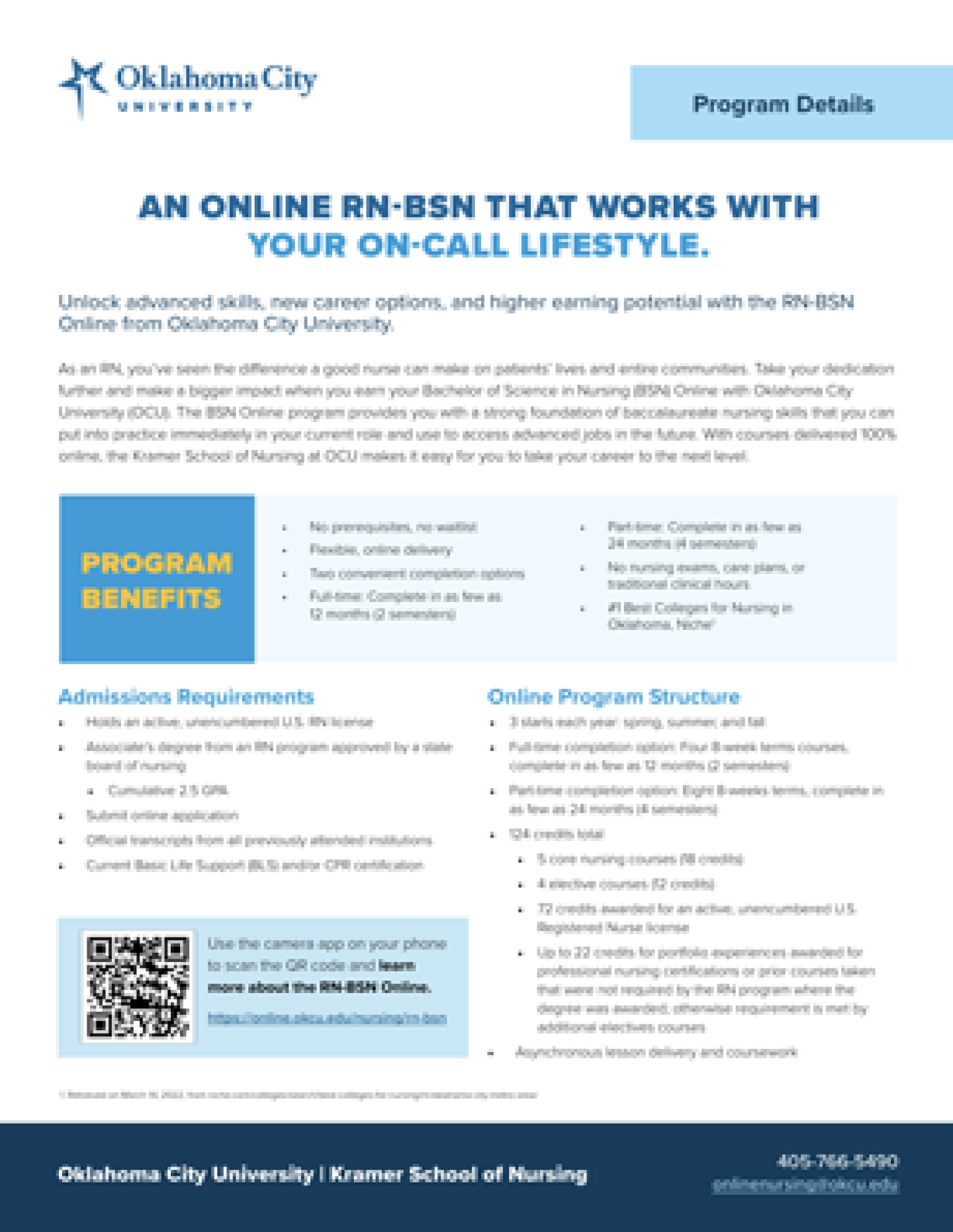Transform your career with OCU’s online nursing program
Let your dedication to nursing guide you to rewarding new opportunities with Oklahoma City University Nursing Online
Looking for an affordable, flexible, and supportive online nursing program? Find an online nursing program that meets all your needs at Oklahoma City University (OCU). Since 1981, the Kramer School of Nursing at OCU has set the standard for exceptional nursing education. OCU offers a pathway into rewarding nursing roles with in-depth instruction, personalized learning experiences, and a practice-focused curriculum. And now, it’s all accessible 100% online.
This will only take a moment.

Get a Program Brochure
Considering a nursing degree to take your career to the next level? Your journey starts here. Complete the form to get a program brochure for Oklahoma City University’s online RN-BSN program.
Get valuable insights into the OCU online experience, learn more about the curriculum, and see where this degree can take you.

Choose an online RN-BSN that meets your goals
OCU’s online Bachelor of Science in Nursing (BSN) is designed for RNs looking to build advanced skills and gain a competitive edge. Our comprehensive online curriculum prepares nurses with the confidence to take control of their careers, the skills to bring about better patient outcomes, and the experience to take on preferred nursing roles with better schedules and higher earning potential.
Why choose OCU’s online nursing program?

Flexible learning
Courses are delivered 100% online, asynchronously. Work on your schedule from wherever you’re located. No mandatory log-in times or traditional clinicals. You can live your life and earn your degree.

Trusted legacy
The program is taught by highly qualified faculty with experience in bedside and leadership nursing roles. This program is accredited by the ACEN and supported by the Higher Learning Commission.

Superior support
Meet with your student success coordinator for help managing your workload, navigating the learning management system, and enrolling each semester. Faculty are always prepared to offer guidance and mentorship, academically and professionally.
Earn your nursing degree online from an accredited school
Oklahoma City University’s Kramer School of Nursing is accredited for both its undergraduate and graduate degrees:
ACEN
The most recent accreditation decision made by the ACEN Board of Commissioners for the baccalaureate, master's, post-master's, and Doctor of Nursing practice degrees at Oklahoma City University's Kramer School of Nursing was Continuing Accreditation.
Click here to view the public information disclosed by the ACEN regarding this program.
The ACEN requires nursing schools to publish the following data:
Oklahoma Board of Nursing (OBN)
Contact information for the Oklahoma Board of Nursing:
Oklahoma Board of Nursing
2501 N. Lincoln Blvd., Ste. 207 Oklahoma City, OK 73105
Phone: (405) 962-1800
www.ok.gov/nursing
Higher Learning Commission
Contact information for the Higher Learning Commission:
Higher Learning Commission
230 South LaSalle Street, Suite 7-500 Chicago, IL 60604
(800) 621-7440
www.ncahigherlearningcommission.org
State Authorization Reciprocity Agreement (SARA)
Please contact an admissions outreach advisor to confirm if your state of residence is authorized for admissions.
Disclosure Statements for licensure programs at Oklahoma City University, Kramer School of Nursing
Professional Licensure Requirements All of Oklahoma City University’s licensure or certification track programs curricula meet State of Oklahoma educational requirements for licensure or certification and/or prepares students to take an Oklahoma licensing exam. The curricula for programs customarily leading to licensure at Oklahoma City University have been designed to meet the licensure/certification requirements in Oklahoma, as well as preparing students to apply for licensure exams in the State of Oklahoma. Please follow the link to OCU's Professional Licensure Disclosure and state-by-state information: Oklahoma City University | Overview
How does online nursing school work?
With Oklahoma City University online nursing programs, you can determine a schedule that works for you to complete your online RN-BSN or online nursing master’s program coursework, including a new part-time option for RN-BSN. Plus, with online learning you don’t have to put the rest of your life on hold. Apply the new skills you learn in class immediately to your present role and demonstrate your acquired competencies before you’ve even graduated. Many students also find they can count hours spent working toward credit for their practicum projects, helping them to meet requirements without extra effort.
The Kramer Way: Creating a positive online nursing school environment
Oklahoma City University’s Kramer School of Nursing is committed to meeting the individual needs of students. Caring, kindness, and respect are the core values of its philosophy, referred to as, “the Kramer Way.” All students, faculty, staff, and other members of the OCU community are expected to treat each other with these values in mind. The Kramer School of Nursing believes that comporting within these traits leads to a nurturing environment that fosters the best learning environments.


Learn from experts dedicated to your success
Our expert faculty are dedicated to giving students the best experience possible. Professors offer virtual office hours and one-on-one appointments where you can seek their advice, learn more about their research interests and roles as industry leaders, and receive mentorship on career decisions and opportunities. The Kramer School of Nursing’s online bachelor’s and master’s nursing programs provide a robust sense of integrity for nursing students looking to grow and succeed.

An education that can save lives
We’re committed to helping our state and our nation get back on track to reinvigorate the nursing field with confident and capable professionals. Nurses are essential in every sense of the word. It is imperative that they are supported with adequate staffing and resources. By simplifying our application process and admissions requirements, plus 100% online options available for students across the country, we hope to educate more nurses to ready them for advanced careers with BSN degrees and online nursing master’s programs.
Be a part of the faction of nurses who will revive nursing as a thriving field while putting yourself in a position to learn more, earn more, and go further in your nursing career.
